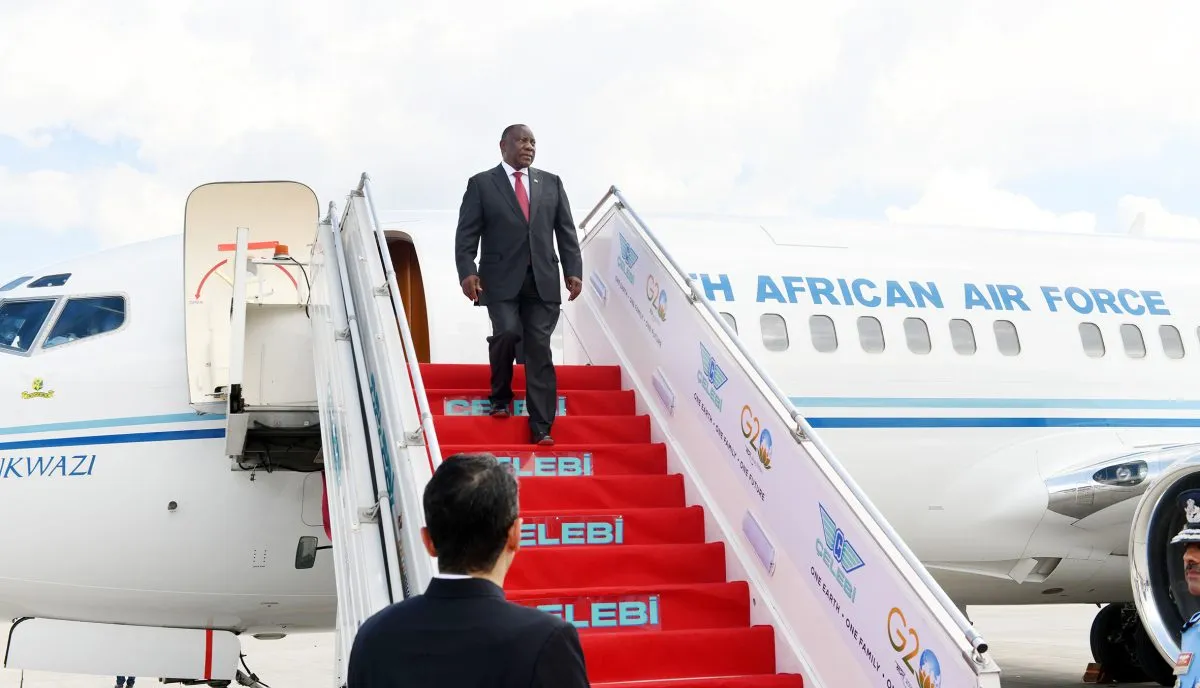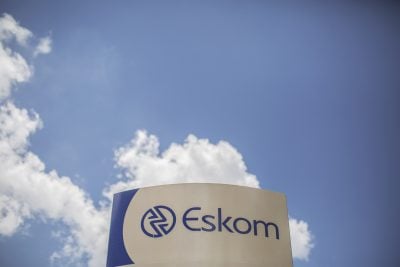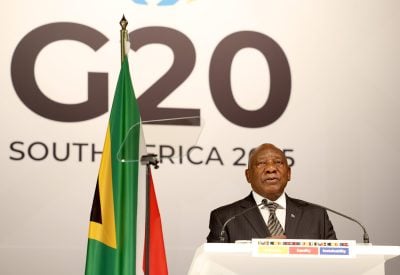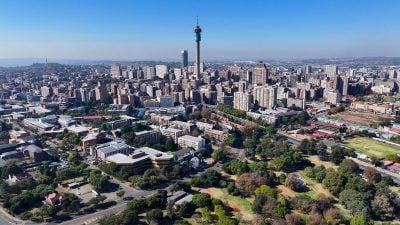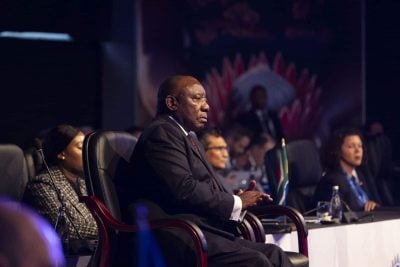This article is part of a Special Report, kindly supported by Brand South Africa.
“Guided by President Cyril Ramaphosa’s vision, South Africa’s G20 agenda focuses on fostering equitable trade, reforming international financing frameworks, building resilient health systems, advancing food security, driving decarbonisation, and addressing climate risks,” says the CEO (Acting) of Brand South Africa, Sithembile Ntombela.
“These priorities reflect South Africa’s commitment to inclusive sustainable development that leaves no one behind.”
The annual Davos gathering also gives the country, Africa’s most diversified and industrialised economy, a vital platform to highlight its priorities for the continent under the presidency of the G20, which it assumed on 1 December 2024.
South Africa aims to align its leadership with international efforts as it participates in shaping global, regional and industry agendas through the G20 role, held under the theme Solidarity, Equality and Sustainability.
Ntombela says that the Team South Africa programme in Davos also aims to reaffirm the country’s role as a bridge between developed and developing economies and showcase its unique position as a global hub that unlocks Africa’s growth story.
The WEF 2024 theme “Collaboration for the Intelligent Age” aligns with South Africa’s focus on leveraging innovation and partnerships to drive progress in an era of rapid technological advancement and complexity.
Transformative opportunities
“We hope to attract investment that can unlock transformative opportunities across key sectors such as energy, logistics, green industrialisation, exports in tourism, creative industries, digital services, education and healthcare,” says Ntombela.
The platform will, she says, allow South Africa to position itself as a stable, investible destination for global trade and investment under the umbrella of the diversified new government, which has been embraced by investors.
The Davos team, comprising high-powered government officials and private sector executives, will showcase the progress that has been made in the past year through vital collaboration with business that actively sought to address challenges in the economy and roadblocks to investment.
These efforts have been carried out under the umbrella of Operation Vulindlela, a joint initiative of the Presidency and National Treasury to accelerate the implementation of structural reforms and support economic recovery in key sectors.
This has been a game-changer for the country. The energy sector, for example, has unlocked more than $20bn in investments. The second phase of Operation Vulindlela, which kicks off in 2025, has even bigger ambitions.
“This collaboration has already, and will continue to, foster innovative solutions to critical issues such as energy security, infrastructure deficits, and job creation and it has helped us to mobilise substantial investments in different sectors,” explains Ntombela. “By fostering trust, building alliances, and inspiring collaborative innovation, South Africa is committed to shaping an intelligent age defined by inclusive prosperity, resilience, and sustainable progress.”
Investor confidence
For the upcoming Forum, Brand South Africa, the government’s official marketing agency, has partnered with a range of stakeholders in the private sector.
These include mining companies Exxaro, Anglo American and African Rainbow Minerals, global brewer AB InBev, insurance giant Old Mutual, global technology group Naspers, the Development Bank of Southern Africa, banking group ABSA and other large corporations active in the country.
Investor confidence has been boosted by the successful implementation of a Government of National Unity put in place after the national elections in 2024. This multiparty governance arrangement has boosted investor confidence, strengthened the currency, lowered borrowing costs and cooled inflation.
S&P Global’s revision of South Africa’s credit rating outlook to positive during the past year reflects the growing optimism in the country’s reform trajectory.
Gains to celebrate
There are many gains to be showcased at the 2025 Forum, including the achievement of a reliable power supply after several years of grappling with a serious electricity crisis. A balanced fiscal outlook has created fertile ground for business and consumer growth.
Structural reforms are finally paying off, including in improving the logistics infrastructure and performance.
South Africa is leading the advancement of Africa’s green mining value-chain and developing connectivity with the continent to drive economic growth and development on the back of the African Continental Free Trade Area.
In 2025, the priority for Brand South Africa, the government’s official marketing agency, is to showcase how the country is actively shaping a collaborative, people-centred agenda for the technological era by leveraging innovation, fostering inclusive economic growth, and decisively leading climate action, says Ntombela.
“As Africa’s most industrialised economy and a leader in multilateral institutions, South Africa is committed to unlocking the continent’s potential, driving regional integration, and contributing to global solutions for growth, sustainability, and resilience.”
A nation determined to rise
Looking forward, South Africa is on a drive to demonstrate the sheer grit of a nation determined to rise.
“While private and public investment faced hurdles in 2024, we’re turning the tide with more targeted efforts, particularly in energy and infrastructure. The country expects 4.2% average growth in gross fixed capital formation over the medium term. Our trade balance is also evolving, supported by favourable terms and disciplined import/export strategies.”
South Africa also aims to increase its reach and relevance in terms of foreign policy as it vigorously pursues multilateralism and focuses on building unity, inclusive economic development and shared prosperity for the African continent and its people.
“South Africa is determined to use every means at its disposal, including our participation in global fora, to advance the African Union’s Agenda 2063 and to consolidate regional integration,” Ntombela concludes.
South Africa’s unity government holds firm
South Africa’s Government of National Unity, formed after national elections in 2024, has boosted the economy and focused positive attention on the country, even amidst concerns about whether the diversity of its members would enable it to stay the course, writes Dianna Games.
In a groundbreaking development ten parties from across the political spectrum came together to chart a new path for South Africa in response to the message from voters that a more diversified and broad-based government was needed to tackle the country’s economic, social and political challenges.
The former majority ruling party, the ANC, was joined in government by the former official opposition, the Democratic Alliance, as well as the Patriotic Alliance, Inkatha Freedom Party, Good Party, Pan Africanist Congress of Azania, Freedom Front Plus, United Democratic Movement, Al Jama-ah and RISE Mzansi.
In an expanded government of 32 cabinet ministers and 43 deputies, several key ministries such as Home Affairs, Public Works and Basic Education went to GNU parties. Others assumed influential positions as deputy ministers and chairs of powerful parliamentary committees.
The majority of the 400 seats in the National Assembly are held by GNU members, with the ANC holding just over 40% of seats, followed by the DA. Eight of the 18 parties in the new South African government are not members of the unity government, including the third and fourth largest parties – uMkhonto weSizwe (MK) and the Economic Freedom Fighters (EFF).
Although there were concerns about how a disparate group of parties with different views on many issues would get along in the GNU, investors responded positively to what was regarded as a business-friendly coalition government led from the front by President Cyril Ramaphosa.
A number of significant new investments were announced in mining, aviation and industry within a few months of the GNU assuming power and the currency strengthened on the back of the announcement of the new government.
The coalition has withstood many tensions, including disagreements among ministers and others over legislation and policy, but the centre has held so far at the national level and compromises have been reached on some difficult issues within a broad evolving social compact.
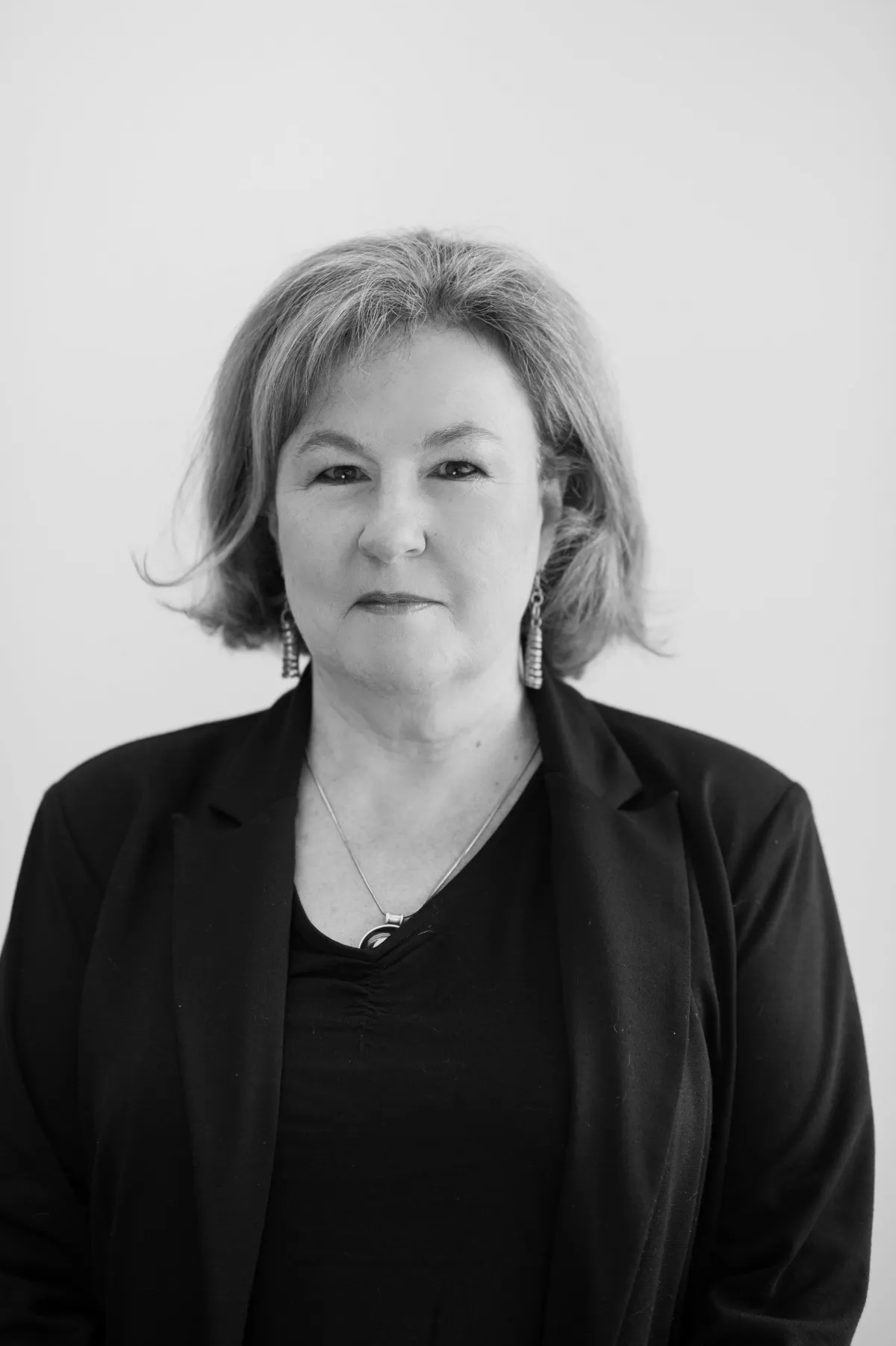
 Sign in with Google
Sign in with Google 